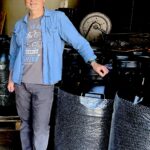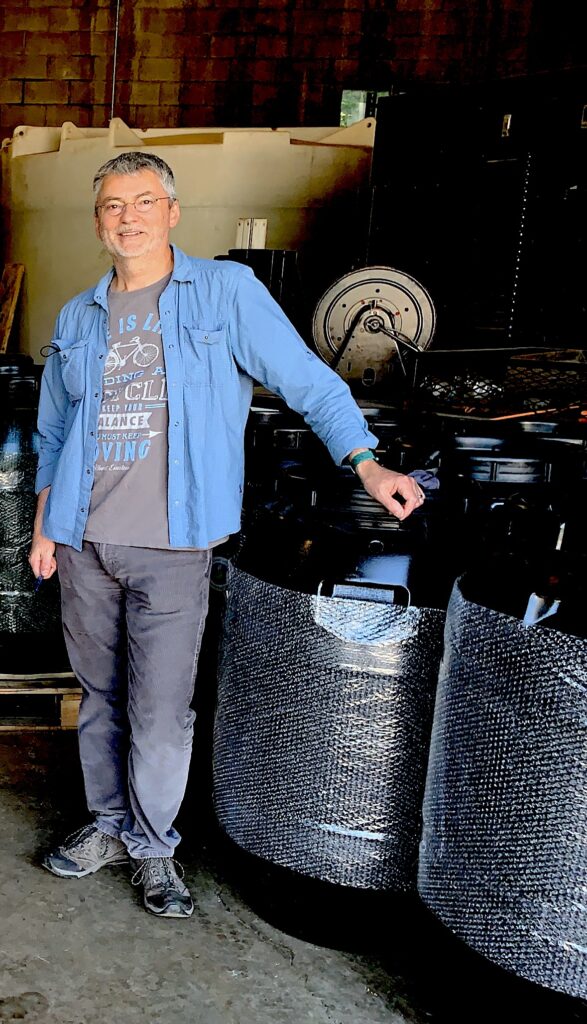
By Elissa Ely
Before he became chair of Sustainable Belmont, before the PhD in pharmacogenetics, before moving to the United States, certainly before any awareness of the environmental needs of a Massachusetts town next to Cambridge, Dean Hickman was picking up litter.
“Have been picking up trash anywhere I go since I could walk,” his Instagram says. Growing up in farm country west of London, traveling the footpath systems, Dean took the “Keep Britain Tidy” campaign of the 1960s to heart.
Many decades later, on a late rainy afternoon when he could have been enjoying a mug of tea, we are circumnavigating Clay Pit Pond. He is carrying a bag of trash, periodically filled and periodically emptied into one of the DPW bins. On his own walks, he often brings the bag home to his garbage can. “Plenty of room,” he says.
This is where the Parry brothers quarried their clay in the late 1800s for bricks. Now the pond holds stormwater from Wellington Brook, slowing its eventual journey to Alewife Brook and the Mystic River. It’s also one endpoint for whatever refuse flows into Belmont storm drains and through its culverts, floating on the pond’s surface and lining its shore. “99% of what you see here comes from storm drains,” Dean explains.
Ranging through topics—why man-made chemicals don’t disappear; how Rachel Carson’s Silent Spring was formative in adolescence; what the invisible impact of burning gasoline is; how, without his family, he might well retreat to a yurt—he is also bending for plastic straws and plastic bottle caps, and reaching for a shredded plastic bag snagged on a branch. Left unpicked, they break down into the microplastics absorbed by fish and animals, and sometimes, eventually, by us. He finds a crushed soda can, a rectangle of duct tape, a thick strip of red DANGER tape some workman left after a project. ”Litter is not safe,” he says mildly, with the expertise of a biochemist to back it up. “There are so many things to worry about. But we all have choice.”
Dean made some of his first environmental choices as a teenager, when unexplained food additives on labels began to intrigue him. He wrote to consumer advocate groups, and they sent dire photostats about carcinogenesis. He wrote to food companies, and they sent soothing brochures that didn’t address safety. What he needed to understand was more complex, hovering somewhere in between. Reading scientific literature was a start. This led to a degree in biochemistry, a year in agrochemical research on the metabolism of pesticides in soil, and eventually, a PhD.
As a child, he had wanted to become a veterinarian. He didn’t, in part, because seven years seemed an endless education. But life is a process with humor; the entirety of Dean’s education between undergraduate and postdoctoral work took closer to 10. Moving to the United States for a series of jobs, he landed finally in an energy-efficient house in Belmont. Before the pandemic he biked to work; now the home office commute is shorter.
His full-time job is with a nonprofit, discovering and developing affordable medications for tuberculosis treatment. Then there is Sustainable Belmont, whose programs, initiatives, and website encourage residents towards a more sustainable community. The www.sustainablebelmont.net site opens onto a serene Lone Tree Hill vista. Drop-down categories are like metaphorical vistas: energy, home, climate, action, biodiversity, all part of what he calls “humanity”—which is to say, opportunities for community. Advocacy is politely welcomed. Complicated issues are explained and personalized to Belmont.
Civility is key. For instance, who among us has not seen a stranger toss garbage onto the street? Here is the Sustainable Belmont Clean Green FAQ advice: “It is okay simply to pick up the litter (if it is safe to do so) and say nicely, “I’ll take care of that for you.” It’s a response so peaceable and productive that readers might need to blink twice. “You have to play the long game,” Dean says. “Offer a little education, provide a platform, give people agency, aim for reasonable compromise and engage community in any way you can.” Environmental reform is a patient process.
And environmental reform is a personal process. One of his great satisfactions is when strangers pull invasive weeds together on a plot of land, or pick up trash as part of a project; for a while, those who might live across barbed political fences come purposefully together. “It’s the interconnectedness of all things,” he says. “We want a simple solution, but most of the time it’s complicated. There IS a simple remedy, though. It comes in one word: respect.”
In 2022, Sustainable Belmont respectfully highlighted solar power, electric cars, and other local electric interventions. It hosted presentations on the dangers of per- and polyfluoroalkyl substances (PFAS) and the benefits of native planting, offered information about rain barrels and healthy lawns, educated on the hazards of gas leaf blowers. And, of course, there were invitations to pick up trash with others.
“Overall, I think you have to stay hopeful,” Dean says. It helps to hear this in times when dire environmental facts let in so much light they can feel blinding (one reason why so many of us choose to live in the environmental dark). But Dean is not overwhelmed. “Things can change,” he points out. “In Massachusetts, we have a climate chief now. It’s something that gives you hope. Climate change will have a seat at the table of every state-agency decision.” How useful it could be, he adds, if we also had a sustainability director at the Belmont town level.
And yet, not long ago in Cushing Square, a little boy and his father noticed a man running by, breaking his pace every now and then to pick up a piece of trash from the sidewalk or street. He had a bag with him, or maybe it was his nabber grabber. “What’s that man doing?” the boy asked. “Picking up trash,” his father said. The little boy thought for a few seconds. ”Can I do it, too?” he asked.
Elissa Ely is a community psychiatrist.



Sorry, the comment form is closed at this time.